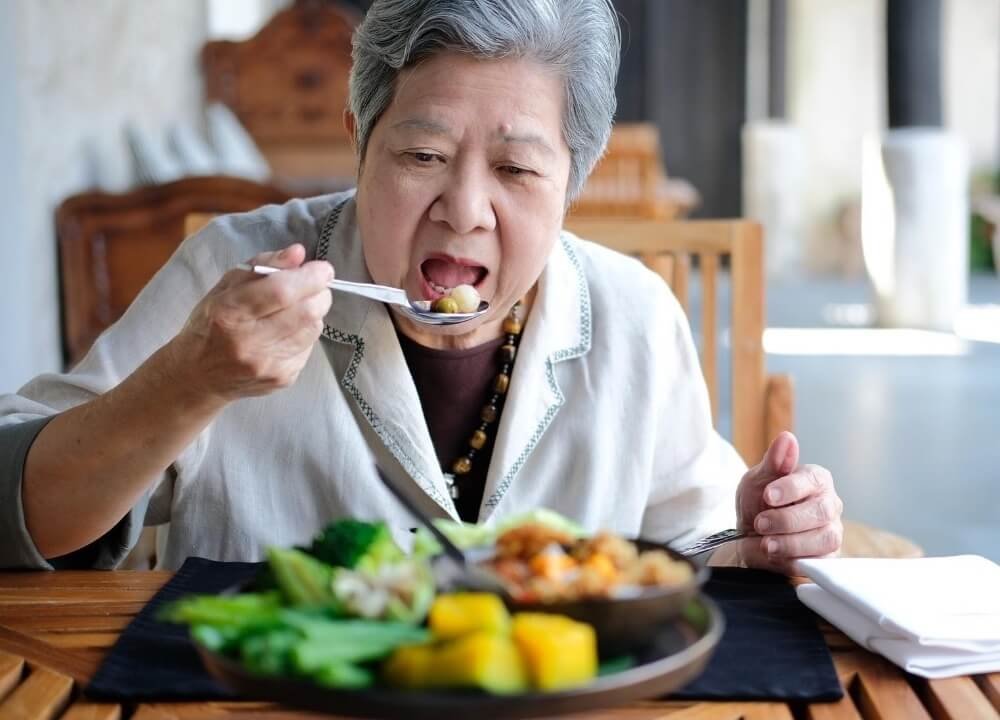With the progression of dementia, taste buds weaken, making patients develop strange food cravings, even for extremely spicy foods. But is dementia and spicy foods linked increasing dementia risk?
Are Dementia And Spicy Foods Linked?
The prevalence of dementia is on the rise and numbers are expected to double every 20 years.
It appears when your brain suffers from neurological problems leading to loss of memory and poor judgment.
The decline in memory deteriorates the quality of life in the elderly and, in the long term, reduces cognitive function.
The effects of dementia, and problems happening concurrently with it, are extensive. Moreover, they do not affect the brain only.
Scientists have observed significant alterations in dietary behaviors of people suffering from dementia.
These range from the changes in appetite to unusual food cravings.
How Does Dementia Affect Eating Habits?

Dementia leads to various metabolic and psychological changes in the body. These, coupled with the weakened taste buds, change dietary preferences.
During a research study conducted by the Medical research council, the caregivers of dementia sufferers pointed out a preference for foods that are strong and savory in flavor.
Some of the eating patterns in people with dementia are:
- Over-eating
- Binge-eating
- Decreased appetite
- Changes in food choices
- Pica (craving for inappropriate foods)
- Pica (craving for non-food items e.g. mud)
- High consumption of sugary and spicy foods
Do People With Dementia Crave Spicy Foods?

The unusual food cravings vary from person to person. Some people crave sweet foods while others incline towards spicy or salty foods.
The reason why the elderly with dementia crave spicy foods are as follows:
1. Dementia Weakens The Taste Buds
The craving is due to the disappearance of taste buds with the progression of the disease.
Humans can identify salty, sweet, sour, bitter, and umami taste.
However, dementia sufferers lose this ability with time. Dementia makes them unable to identify a particular taste as well as differentiate between two different flavors.
This is due to the loss of nerve endings in the tongue.
Since dementia appears with morbid brain conditions, it diminishes the neurological sense responsible for taste.
The elderly cannot feel the tanginess of food so, they ask for a stronger flavor. The same is true for salty foods.
2. Capsaicin Releases Endorphins
Ever wonder why spicy food burns tongue? It is due to the active ingredient present in chili, called capsaicin.
Capsaicin instigates pain receptors in the mouth and tongue, causing a burning sensation.
Due to the activation of these receptors, the brain translates it as a painful experience and floods the body with endorphins.
These are responsible for elevating mood and reducing the painful sensation.
Additionally, dopamine is released which is involved in the reward system of the brain. The result is a euphoric state called “runner’s high”.
Since such neurotransmitters are low in quantity in dementia patients, the body creates a compensatory mechanism.
It generates cravings for foods that cause endorphins to rush.
Is There Any Cultural Relation To Cravings of Spicy Foods?

Food choices vary immensely throughout the world.
This is also true for the condiments used to prepare local cuisine.
Predictably, the taste buds of natives of each region are adapted to the flavors of their local food seasonings.
Asians consume far more chili and spicy herbs in their meals as compared to westerns.
Therefore, experts think dementia sufferers from the Asian region are more likely to indulge in binge-eating spicy foods.
In such regions, the population develops a habit of using strong spices.
So, they misunderstand their lack of sense of taste in dementia as a bland and flavorless meal.
This results in an excessive intake of chili among the old age population.
Although it is more prominent in areas where spicy cuisine is widespread, westerns are also prone to such cravings.
Their chili usage is minimal but hot sauces and other herbs are still popular in Caucasians and western ethnicities. The proportion may be far lesser but they often enjoy pickles and jalapenos.
A study done in the UK showed that 15% of participants reported a likeness for spicy foods frequently after the onset of dementia.
Do Spicy Foods Increase The Incidence Of Dementia?

High spicy food intake may not be as harmful as excessive use of sweets, but it has a deeper relationship with the cause.
Scientists think that chili consumption is linked with an increased risk of dementia.
In Asia, chili is the most frequently used spice. In some regions of China, one in every three adults consumes chili daily.
It has many beneficial impacts on obesity and hypertension due to the presence of capsaicin in it. But there is more to the story.
Considering these properties, capsaicin should reduce the oxidative burden of the brain and enhance cognitive function but evidence proves the opposite.
People who consume more than 50g of chili per day experience a reduction in cognitive function.
The findings also suggested:
- Twice the risk of self-reported poor memory
- 56% increase in the incidence of memory decline
- The low global cognitive score for cognitive function
- A decline in memory co-efficient with each 10g increase in chili intake
- Both males and females are equally vulnerable
- Less marked in overweight individuals
- Those with normal or low BMI are more prone to dementia due to chili
Apart from these, spicy foods can upset the stomach and lead to long-term gastrointestinal problems.
Considering these findings, it is essential to cut back spicy food consumption in seniors in order to slow the progression of dementia.
How to Manage Spicy Food Cravings in Dementia?

1. Salty foods can replace spicy foods but they should be used with care as they increase the risk of hypertension in the elderly.
2. The senses of smell and taste are intertwined. So, preparing food with seasoning that can create a delicious aroma helps in managing cravings of spicy food without actually having a spicy meal.
3. Spices, other than chili, and herbs should be incorporated to increase the flavor of the meal.
4. Some naturally occurring spicy foods like jalapenos and pickles used as a seasoning.
Conclusion
The sense of taste diminishes and endorphin production reduces with the progression of dementia.
To overcome these troubles, the elderly often crave spicy foods. They can cause an upset stomach and even worsen dementia with time.
The decline in memory function due to chili is higher in the underweight population. To reduce this possibility, chili should be replaced with better spices and herbs.
Salty meals can be used in a controlled amount but some naturally occurring spicy products like jalapenos and pickles are better substitutes.

